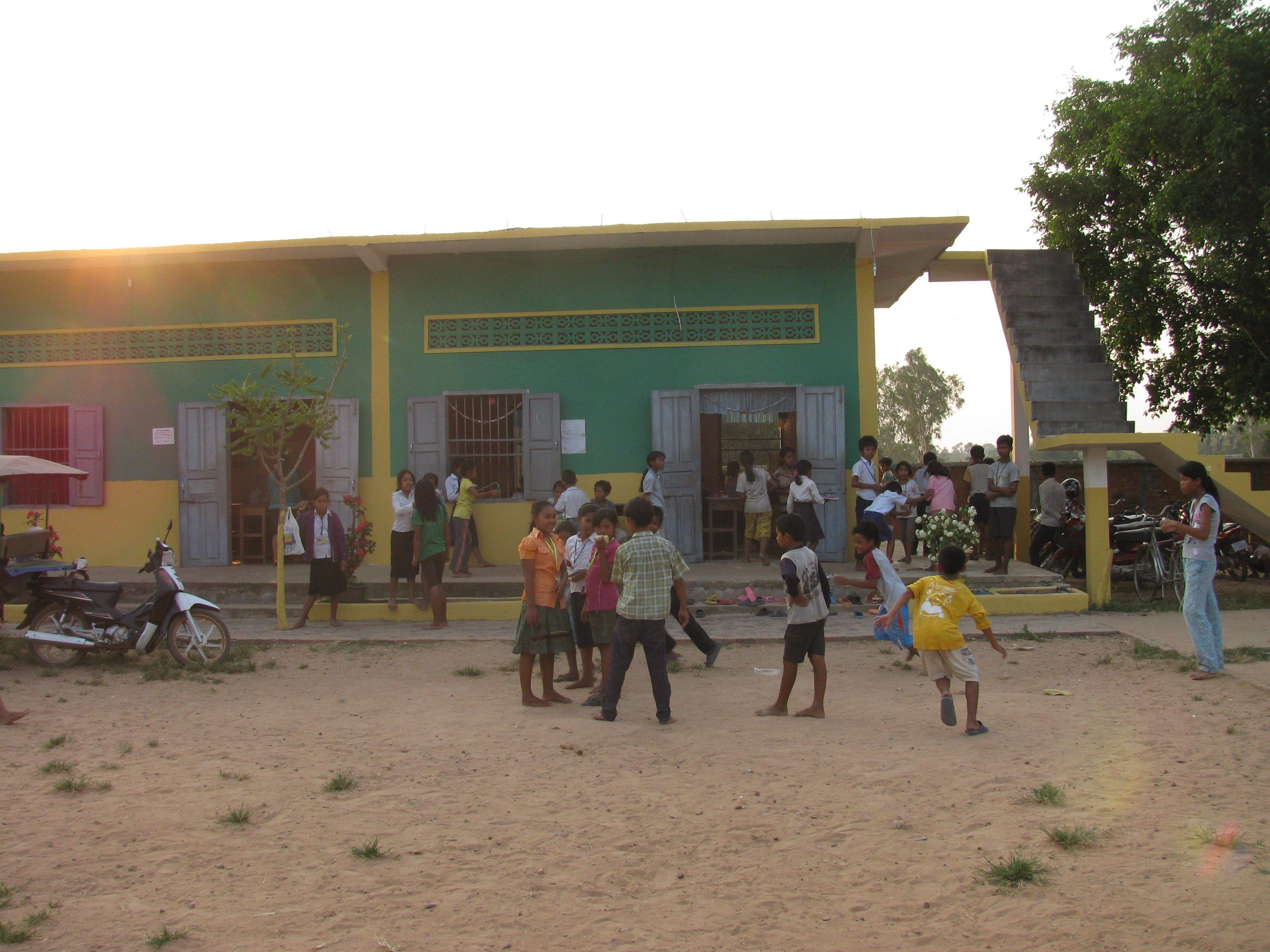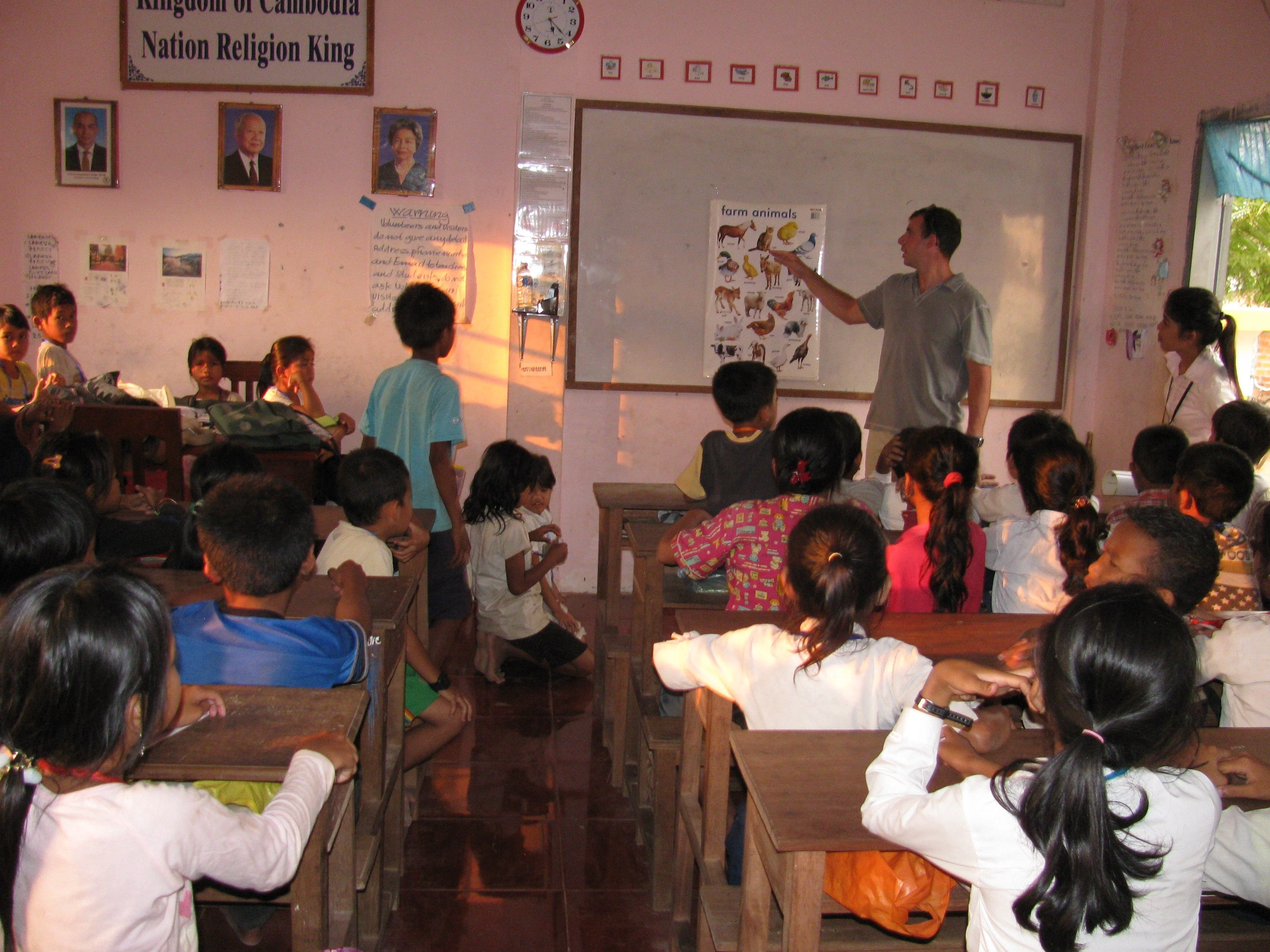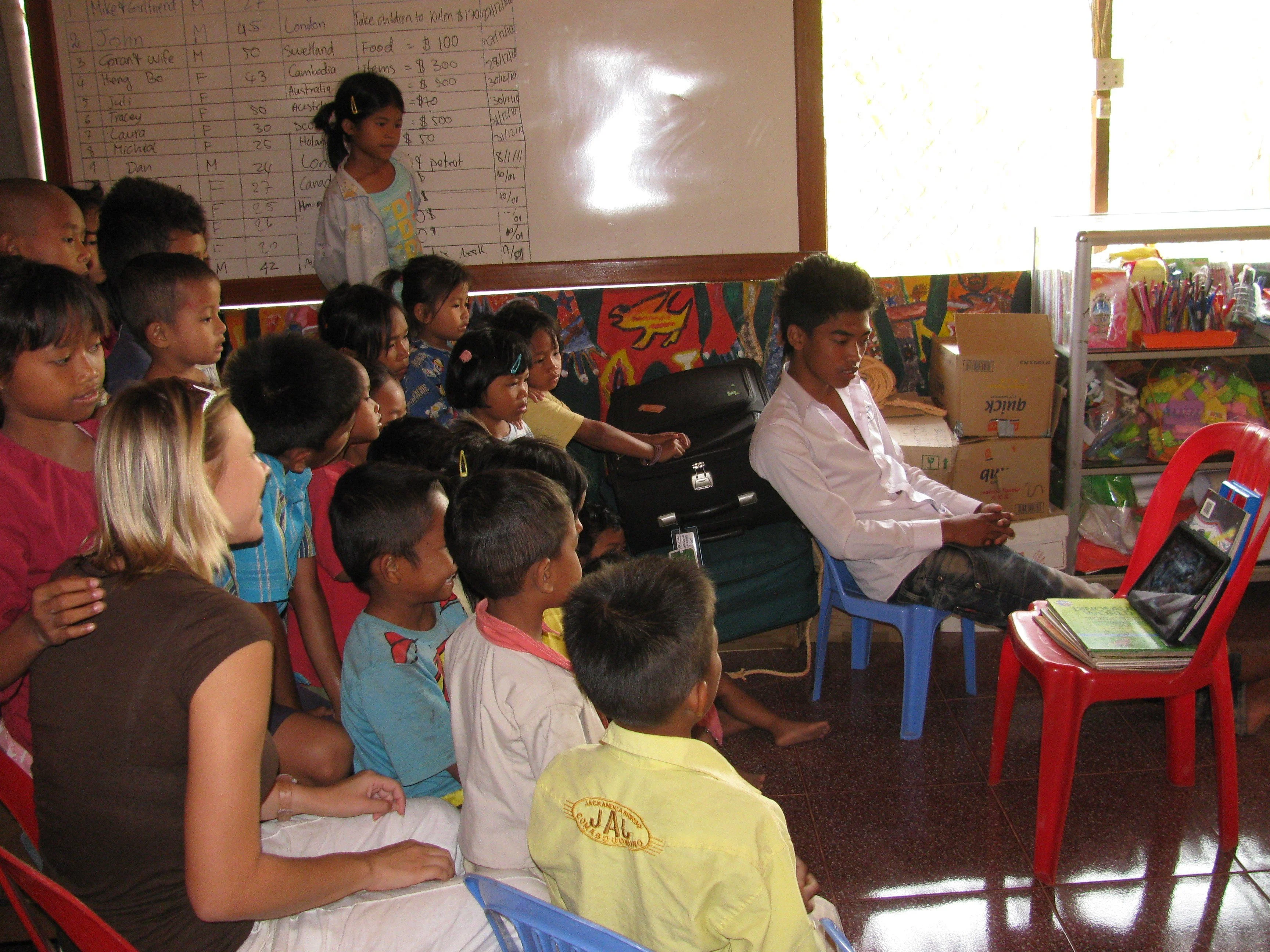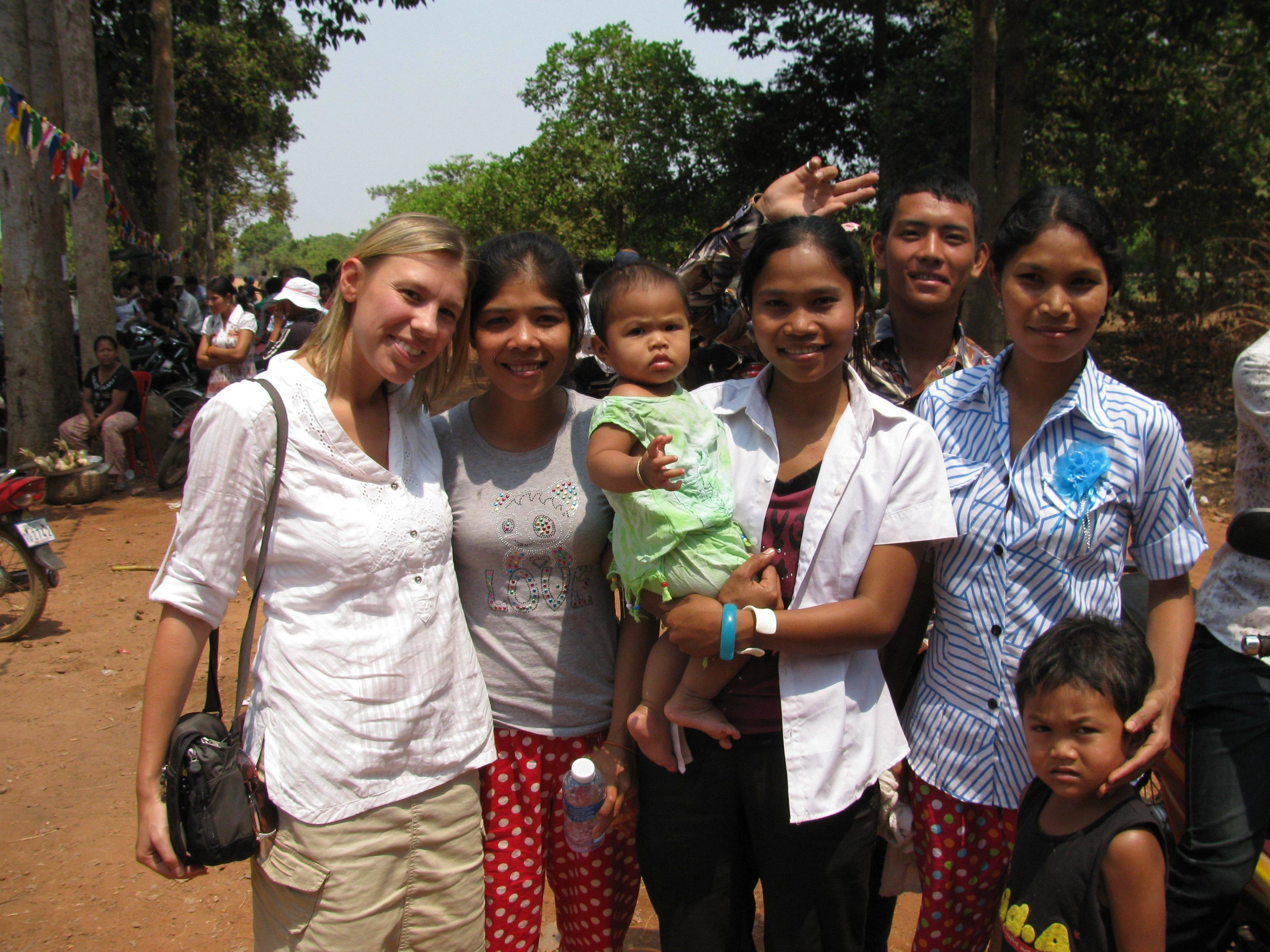TeachingTraveling.com: Welcome to Robin Botto, experienced world traveler!
Robin, tell us about your background.
Robin: Tim and I are Bostonians and have been married about 2 years now. We had very little background in anything teaching related. We both worked in corporate America, but quit our jobs in Boston to take some time to travel in Asia.
One thing that we really wanted to do while we were traveling was volunteer. It’s great to sight-see, but we know that the best way to interact with the locals is to really get involved.
We both had varied experience traveling the world; Tim actually served in the military and spent time in Korea and Iraq, and in both of those situations he had jobs that required a lot of interaction with the locals.
I studied abroad in Australia and spent a lot of time traveling throughout Europe. When we planned our trip to Asia we knew we wanted to learn as much as we could about the cultures we were traveling to and there’s really no better way to do that to volunteer.
TT: Fantastic! Tell us more about your travels and volunteering.
R: During our Southeast Asian trip we ended up visiting around 50 destinations over a five month period. It was literally “the trip of a lifetime” and each place opened our eyes a little more, but it was really the places that we got to spend a lot of time in that we appreciated the most.
We were surprised when an Orangutan came out of the jungle in Borneo just to say hi and share some love, we spent an entire week on an island so small that there were no cars and only one walking road, and we stayed extra long in Luang Prubang in Laos just because the young monks walking by with the temples in the backdrop were the best view from a cafe I’ve ever had in my life.
Our longest stop on the trip however, was our 15 days in Siem Reap. Every morning, Pomsen, our 18 year old driver was waiting outside early in the morning to transport us to the village where we were volunteering, and many nights we didn’t get back into town until 8pm at night. The days were long, but so fulfilling.
Cambodians are some of the most grateful and positive people in this world, and spending two weeks there felt like gaining new family. Tim and I went to local village parties (similar to Thanksgiving in America), visited ancient temple sites with the locals who knew the folklore and really cherished the sites, and even experienced khmer hip-hop when we were invited to go to a Karaoke club.
TT: Love it! How did you find this volunteer teaching opportunity?
R: We thought we wanted to work in an Orphanage in Cambodia. One of the things I had spent the most time researching before our trip was the problems with child sex tourism in Cambodia. I think everyone has something they feel very strongly about. For me this was that thing. I thought that helping an orphanage, meant a few more children could be taken care of and not left on the street to survive by any means possible.
Orphanages in Cambodia, as it turns out, tend to also be corrupt, and many times require an outrageous donation for your time that doesn’t go to the children. We had begun giving up hope on finding a good opportunity for a two week volunteering window, when we ran into a woman in Phuket over Christmas that had just finished spending two weeks at the orphanage. but as it turned out the Orphanage we found was also affiliated with a school that taught English and Japanese as a second language in a local village for free.
We decided we would volunteer at both the orphanage and the school, and ultimately found that we were able to contribute more and therefore enjoyed are time more at the school.
TT: So inspiring. How did you find the money to fund this travel?
R: We mostly funded our travels by saving a lot of the money we were making. We actually had a special travel savings account and religiously put money in the fund along with house and retirement savings. Also, we did tell a lot of people about our plans to volunteer before we left and were lucky enough to have friends, coworkers, and family that did give us some contributions which we put aside specifically for our time volunteering to buy things such as rice, sugar, and toys.
TT: Tell us one moment from your travels that was particularly powerful.
R: While we spent our afternoons in Cambodia teaching English and interacted with well over 100 locals there, we spent our mornings at the orphanage with a much smaller group of kids that ranged between 3 years old and 19 years old. I found myself spending a lot of time with the three oldest girls in the orphanage, who both spoke conversational English, but also were able to share intimate details about their lives as young girls in Cambodia.
We would speak of a broad range of topics, but most memorable was when she looked up a word in her Kmher to English dictionary and pointed to it and asked me to pronounce it. The word was “virgin” and she matter-of-factly explained how important this was in order for a Cambodian girl to find a good husband. Our intimate conversations about their culture was enlightening. I thought the girls might be more guarded in sharing some of the more private parts of their country, but I found that they actually were eager to talk to me about the harder parts of their lives.
During other conversations with the girls I learned that although the orphanage was backed by a New Zealand treasurer and dependent on Western countries for necessities, the only time they were able to have “female supplies” were if they were fortunate enough to have some money to purchase it themselves.
Even though, I perceived women’s health needs to be a necessity, it is not a subject that Cambodians (particularly men) prefer to speak about, so it is never addressed. I bought the girls pads which in Cambodia will cost approximately $1.50 for each pack.
When they saw what was in the bags their faces lit up and they hugged me as if I had come bringing gold. It was a lesson in how we take for granted the most basic of luxuries, and how easy it is for men to ignore needs that don’t apply to them.
TT: Such an important point! Now, how have your travels and volunteer teaching abroad impacted you in your current career?
R: I know teaching had a profound effect on our lives. My husband now works in a predominately Chinese community in the United States, and his ability to relate to the children and bridge the culture gap largely comes from his experience in Cambodia.
In my career in the corporate world my experience has taught me everything from higher patience thresholds, to how to speak clearly and concisely when speaking on the phone to a non-native speaker. (I frequently get compliments on how easy it is to have a conversation compared to many of my colleagues)
TT: How have your travels impacted you as a person?
R: Our time in Cambodia affected us in a lot of ways. Anyone who has ever been to that country will tell you that their warm hospitality is unparalleled. The people we met were so amazingly beautiful and caring that it reminded Tim and me about how important it is to have strong personal interactions.
It also was a lesson in how poverty is not synonymous with unhappiness. In fact, I am positive that most of the students we taught in those stifling hot cement classrooms were happier than many of their counterparts in the U.S. They are grateful and respectful, and generally the type of young people I wish there were more of in America.
I know that the experience convinced us that we wanted to make more of our traveling about teaching or volunteering, because we were able to gain so much from this experience.
I know that even if we have kids of our own, I would feel comfortable bringing them with us to these areas to help them understand what life is like for children in other countries. I don’t think I would have felt that way until having an experience like the one we had at the Savong School.
TT: What advice do you have for other teachers who are dreaming of travel?
R: I would say definitely be very careful about what organization you choose to volunteer at. Even many organizations that are backed by NGOs may run corruptly or just inefficiently, making the experience more frustrating. If you can speak to someone who taught or volunteered about their experience it may help you to keep your expectations at the right level.
TT: Robin, thanks so much for this helpful and inspiring interview! Readers, spread the word about this amazing event! You can also read more about Robin on her blog, “On the Banana Pancake Trail.”

The author, Lillie Marshall, is a 6-foot-tall National Board Certified Teacher of English from Boston who has been a public school educator since 2003. She launched TeachingTraveling.com in 2010 to share expert global education resources, and over 1.6 million readers have visited over the past decade. Lillie also runs AroundTheWorld L.com Travel and Life Blog, and DrawingsOf.com for educational art. Do stay in touch via subscribing to her monthly newsletter, and following @WorldLillie on social media!









JRinAsia
Tuesday 1st of January 2013
It's true what she says about Cambodians being grateful and positive That is one thing that stands out in my mind until this day!
Elizabeth Do
Tuesday 6th of December 2011
That sounds like a great place to go. How come you said Asia when it was just a country in Asia?
Lillie of TeachingTraveling.com
Wednesday 7th of December 2011
You're right that Cambodia is just a country in Asia, but sometimes it's helpful for people interested in the whole region to mention Asia as a whole.
Duncan Stuart
Thursday 17th of November 2011
Robin, thank you for your very kind comments. I'm a New Zealand based supporter of the school and orphanage. One point I'd make is that orphanages in Cambodia are not strictly orphanages - that is, most children come from families that are extremely poor and unable to support their children. There is no Government safety net in Cambodia, so "orphanages" have been established - in fact Monasteries have fulfilled this role for centuries. So readers who are thinking of looking up "orphanages" should be clear that there are families involved. In our case the dominant the story of these families is that the marriages have split - alcohol and violence feature in some of these case - and that the sole parent is unable to provide for all the children. In other cases a parent has died.
I would say if you are looking to assist at an orphanage and you wish to make sure it is legitimate - make sure it is registered locally, ask for references from other volunteers, find out if they are focused purely on your money, or on what you can bring (time and skills) and ask what the education programme is for the children (if there is none, then don't support it) and ask yourself: how will my involvement make a long-term and lasting difference here?
Robin mentions three senior girls. One of them (with the yellow bag, top picture) previously lived at another orphanage that put on cultural shows for visitors - and took donations, but did not send their children to school. The girl is thriving at school now, (these girls go to English class in the morning, then off to High School, and then in the evenings go to Savong's langauge school nearby - they're motivated!) and our commitment is for her and the others - when they graduate from Grade 12 - is to sponsor them through university. That's the idea - to equip disadvantaged children with the best possible opportunities.
The local students enjoy visitors. The older children love practising their language, and love learning about the lives of others. We're really thankful to people like Robin and Tim for sharing their skills and passion, and also for telling it like it is. You reminded me how hot those classrooms are! Above all, you remind me of those glorious children who don't whine about their circumstances but - rather - value the opportunities that come their way.
Lillie of TeachingTraveling.com
Thursday 17th of November 2011
What a fascinating, useful, and rich comment! Thank you!